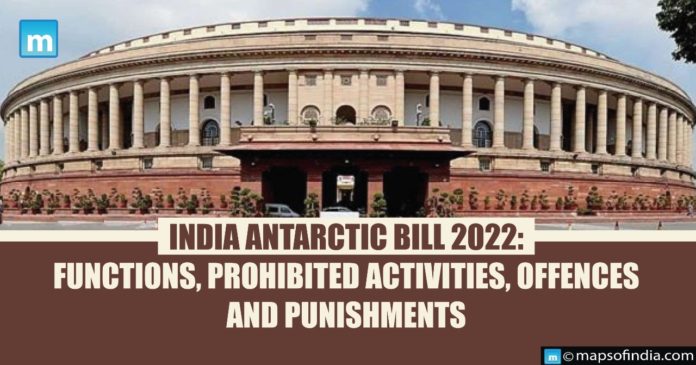Both the houses of the parliament, Lok Sabha and Rajya Sabha, passed the Indian Antarctic bill. The president’s signature will convert it into an act. This bill is divided into 57 sections.
The main objective of this bill is to protect the northernmost region of the earth’s surface, which is an arctic region. For the same purpose, several treaties and conventions came into force. The Indian government introduced the “Indian Arctic Bill 2022” to implement three of the most important documents.
What is the Indian Antarctic Bill 2022?
The Indian Antarctic Bill 2022 is an idea launched by the central government to protect the Arctic environment with some provisions of national measures. This bill consists of three treaties.
These three treaties are as follows :
- Antarctic treaty
- Convention on the Conservation of Antarctic Marine Living Resources
- The Antarctic Treaty: Protocol on Environment Protection to the Antarctic Treaty
Applicability of the Act
The bill’s provisions will be applied to any person going to the region as part of an expedition, research, vessel, or aircraft that is a part of an Indian expedition to the southern region, Antarctica, with a permit issued under the bill.
It also comprises a definite area of the antarctic region. The bill states that the continent of Antarctica, including its ice shelves and all the continental shelf regions, is adjacent to them. In addition, it would include the islands, including their ice shelves, seas, and air space south of 60° latitude.
Under the bill, there is also a provision for establishing a central committee, which the central government will set up. The chairman of the committee will be the secretary of the Ministry of Earth Sciences. The committee will be named the “Committee on Antarctic Governance and Environmental Protection”.
The central government will nominate 10 members from different ministries and organisations such as defence, external affairs, the national centre for polar and ocean research, and the National Security Council Secretariat (NSCS).
Apart from the 10 members, the central government will nominate two other experts from the Antarctic environment and geo-political fields.
Mentioned below are the functions of the committee:
1. Grants and permissions
All the steps will be taken under the vigilance of the central committee. People moving to the Antarctic region will have to get permission from the committee. The central committee will ensure and release permits for those going to the Antarctic region for expeditions or research work.
2. Implementation of the treaties
The Central Committee on Antarctic Governance and Environmental Protection will be responsible for the better implementation of the treaties and conventions. Along with this, the committee will also ensure the fulfilment of the international protocols on behalf of India.
3. Data collection
The Central Committee will obtain and review all the relevant information the parties provide to the treaty, convention, and protocol.
4. Negotiation
The central committee will head all the negotiations of fees with other parties for activities in Antarctica. This bill prohibited some activities in Antarctica; in case of violating the central rules, the committee will be charged with penalties.
These prohibited activities are :
- Nuclear explosion or disposal of radioactive waste
2. Introduction of non-sterile soil
3. Discharge garbage, plastic or any other substance into the sea which is harmful to the marine environment.
Penalties and punishments
1. Nuclear explosion
Conducting a nuclear explosion in Antarctica will be punishable by imprisonment of at least 20 years, extending to life imprisonment. Along with this, a fine of at least 50 crore will be imposed.
2. Drilling
Drilling for mineral resources or introducing non-native animals or plants in Antarctica without a permit will be punishable by imprisonment of up to seven years and a fine of between Rs 10 to 50 lakh.
3. Other offences
The central government can notify a few session Courts designed under the bill to specify its territorial jurisdiction. The courts will punish those who violate the rules.




